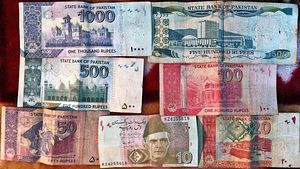On July 5, 2017, the Pakistani currency fell by over 3 percent in what was the currency’s largest decline in nine years. This was like the distant thunder that warns of a looming storm, but its importance was missed as all eyes were drawn on the ongoing Panama Papers investigation in Pakistan and the Afghanistan policy review in the United States.
While there has been a lot of optimism around Pakistan’s economic prospects, dark clouds have been gathering over the economy. Economists within the country have been sounding the alarm for months but their warnings have been ignored, if not unashamedly dismissed by policymakers.
The country’s central bank slowly and subtly sounded the alarm as well, but to no avail. Left with no other option, it did what it had to do: allow the rupee to depreciate. A decision was made to not make the phone calls that manage the value of the rupee. Surprised by this unexpected turn of events, the currency market went into a frenzy.
The central bank’s strategy was sound: deftly manage the decline of the rupee and guide it toward its real value, which, if you are to believe the IMF, is 15-20 percent below its current value against the dollar. The managed depreciation would have a positive impact on the country’s burgeoning trade deficit, which hit a record $32.6 billion, with exports collapsing to a six-year low and imports ballooning to $53 billion.
The government’s response, particularly that of the finance minister, was telling. Roiled by the daily headlines generated by the ongoing corruption investigation in to the prime minister and his family’s foreign assets, it began to see demons in broad daylight. In the government’s view, the decline in the stock market and the rupee was being engineered to create a phony economic crisis. Displeased by the action of perhaps the only independent institution besides the Supreme Court of Pakistan, the finance minister pushed out the acting governor of the central bank, someone who had spent his career at the institution, and put his own man in charge.
In most countries, such a wanton overreach of the government’s authority would lead to an uproar by the business community and cause a significant sell off in the stock markets. Domestic and international media would be in a frenzy and question the soundness of the men ruling the country. The significance of this move, however, was lost amidst the daily noise being generated by corruption investigations.
Facts, however, are stubborn things and no matter what the finance minister and his henchmen would like to believe, there are three cold and hard facts that the government cannot belie.
Fact 1: Pakistan’s current account deficit is unsustainable and a threat to its economic stability.
Fact 2: Pakistan’s foreign currency reserves are built upon foreign borrowing.
Fact 3: Pakistan’s currency is overvalued and needs a major correction.
No credible economist will dispute these cold, hard facts. Even the finance minister, in all his bluster at the podium, will not argue against them.
This brings us to the inevitable. The sandbags and temporary barriers set up by the government can only last for so long. They can twist arms and coerce institutions to manage the value of the rupee and create a false sense of economic stability. Delusional expectations that minus structural reforms, imports of heavy machinery will magically translate into higher export earnings will only get them so far.
With more political uncertainty around the corner and elections coming up, the government seems bent on passing the buck to the interim government, winning the elections, and then dealing with the aftermath of the crisis. If things go out of control during this period, the time-tested approach of blaming political opponents for creating economic instability seems to be the fallback strategy.
The reality is that with time the pressure will build, and when the dam bursts — and it will burst — the house of cards built over the last few years will be washed away. Of course, like all past crises in this country, the ruling elite’s wealth, protected in foreign currency accounts and offshore assets, will be protected. The devaluation of the rupee and the wave on inflation will wipe away the savings and purchasing power of the less fortunate.
The roots of the coming crisis, however, lay in the government’s refusal to recognize the facts and take preventative measures. Rather than reform and strengthen the economy, the government has in fact chosen to bury its head in the sand and defanged the only independent and credible economic institution of this country. This is troubling and should be a cause for concern for those who would like to see political and economic stability in one of the most populous nuclear-armed countries in the world.
Uzair Younus is an Analyst at Albright Stonebridge Group. Views expressed are his own.

































